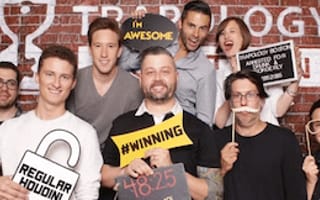
Photos of your most cherished memories are often hard to reach. They might be buried in a dusty old album in your mom’s attic or they’re lost among the 5,000 photos stored on your phone or Facebook.
But what if you could find the exact photo you were looking for — your grandmother on her wedding day or maybe your child’s first step — simply by speaking to Amazon’s Alexa?
That’s the idea behind Mylestone, a Boston startup that hopes to make your memories more accessible with the help of virtual assistants like Alexa.
With Mylestone (formerly “Mylestoned”), you can add photos, video or audio to the Mylestone platform and sit back as a story is generated for you. Whether you want Alexa to remind you of your grandfather’s favorite restaurant, or have your great grandmother read you a Thanksgiving prayer, the virtual assistant can pull from your social data and photos to deliver those memories to you in real-time.
“The rise of virtual assistants has given a once-in-a-lifetime opportunity to re-imagine how we remember life’s most precious moments,” said Mylestone CEO Dave Balter (pictured below). “Imagine bedtime stories told by grandpa who passed away decades ago. Or being able to recall that glorious moment she said ‘yes’ or the magical feeling of that special trip to the Grand Canyon, on command.”
 The company is the first to utilize memory artifacts to generate enriched narratives that are available on command via at-home virtual assistants. Mylestone’s technology uses artificial intelligence (AI) and human inspection to identify common themes and then translates those into compelling narratives.
The company is the first to utilize memory artifacts to generate enriched narratives that are available on command via at-home virtual assistants. Mylestone’s technology uses artificial intelligence (AI) and human inspection to identify common themes and then translates those into compelling narratives.
This week, Mylestone announced they raised $2.5 million in new funding led by True Ventures with participation from Founder Collective, Boston Seed Capital, Converge Ventures and Mergelane, bringing Mylestone’s total funding to over $4.5 million.
Balter said the funding will be used to continue iterating on the company’s product and technology. Eventually, Balter said he hopes Mylestone will shift from a relatively manual process of having users provide content to tying the tool directly to your social feeds for automatic memory retrieval and generation.
The idea for the company came about years ago while Balter was traveling frequently for work. Out of boredom one afternoon, he visited a few of the cemeteries near the airport.
After striking out at cemetery after cemetery, Balter decided that there was a definite decline in people visiting their loved ones’ graves. He began asking why, and through dozens of interviews he found that today, many people turn to social media to grieve.

“It’s easy to post on social media or send someone a private text message, but what I thought was missing was a place to store memories that felt appropriate for the gravity of mourning someone you lost,” Balter said.
“The amount of what we call memories out there is astonishing. We’ve moved from a state of having hundreds of paper photos in an album to 10,000 photos on our phone. Now it’s become so cluttered people can’t access the true memories that exist out there.”
By January 2016, Balter had cobbled together a team of nine to tackle the problem of memory retrieval in the digital age, but it took another year for the current model of Mylestone to arrive.
Though Mylestone started as a deathtech startup, focusing on helping users remember loved ones, Balter said he’s pivoted the company to encompass all sorts of memories. That’s why with Mylestone’s most recent round of funding, Balter also announced the company’s name change from “Mylestoned” to “Mylestone.”
Balter said he sees Mylestone as ushering in a new way of thinking about how we interact with Alexa. He even said, with time, Mylestone’s capabilities could become valuable to industries like edtech.
“A whole variety of businesses would like to take their own content and transform it into narratives,” Balter said. “In the edtech market, many classrooms would allow schools to take photos of their students everyday. What if a parent could get a narrative of what happened every day at school? That’s a powerful tool to feel engaged with your child.”
Photos via social media
Know a company worth profiling? Let us know or tweet us @BuiltInBOS



